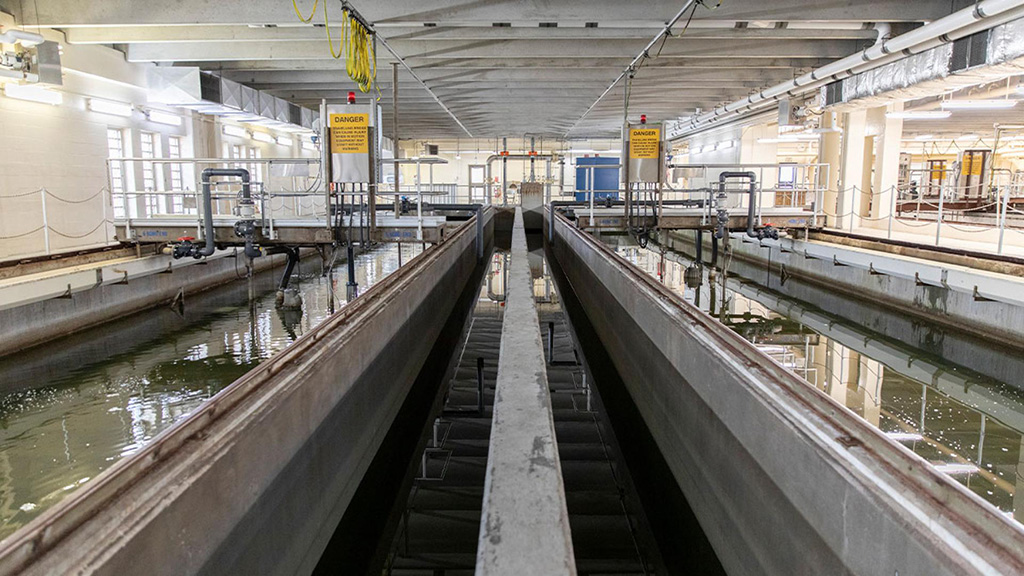Ontario construction stakeholders say they are strongly supportive of the Doug Ford government’s focus on infrastructure spending and boosts for the skilled trades in its latest budget, but from some quarters came concerns over the ballooning deficit and a continuing “piecemeal” approach to housing.
Minister of Finance Peter Bethlenfalvy pointedly focused on infrastructure spending, especially projects to enable more housing construction, in delivering Budget 2024 March 26. To emphasize that focus, the budget document was titled Building a Better Ontario.
‘Extremely pleased’
“We are extremely pleased with this budget,” commented Patrick McManus, executive director of the Ontario Sewer and Watermain Construction Association.
“The minister of finance spent the majority of his presentation talking about what we are building, and needing to build, to both house and move people now and into the future. And the answer was water and wastewater infrastructure, roads, highways, bridges and transit lines.”
“The construction industry should be extremely pleased with the government’s 2024-25 fiscal road map,” added Ian Cunningham, president of the Council of Ontario Construction Associations. “There’s lots in it for our industry including highways, interchanges, hospitals, schools, housing-enabling infrastructure and another $100 million to the Skills Development Fund Training Stream.”
The finance minister said the government will accelerate the government’s 10-year, $190-billion Plan to Build capital spending program, and highlighted the pre-budget pledge to allocate $1.8 billion to housing-enabling infrastructure, including $1 billion for the new Municipal Housing Infrastructure Program and $625 million more for the Housing-Enabling Water Systems Fund.
Bethlenfalvy also unveiled a new $200 million Community Sport and Recreation Infrastructure Fund.
Other stakeholders praising the infrastructure focus included the Residential and Civil Construction Alliance of Ontario (RCCAO), the Ontario General Contractors Association (OGCA), the Progressive Contractors Association of Canada (PCA), the Ontario Stone, Sand & Gravel Association, the Association of Consulting Engineering Companies-Ontario and the Ontario Building Trades.
“The plentiful employment opportunities that we are seeing in Ontario’s construction trades are in large measure the result of firm government commitments to build more housing, transit and energy infrastructure to support growth, especially amid challenges with the cost of living,” stated Building Trades business manager Marc Arsenault.
‘Tighter fiscal conditions’
“As Ontario enters tighter fiscal conditions, it is encouraging that the government continues to invest in new infrastructure and skills training,” added Karen Renkema, vice-president Ontario at PCA.
Both OGCA president Giovanni Cautillo and Richard Lyall, president of the Residential Construction Council of Ontario (RESCON), suggested the budget was underwhelming, with Cautillo asserting the budget was more of a spring economic update “since the vast majority of the items” had already been announced.
Cautillo highlighted a statement indicating the government was exploring opportunities to support other large-scale projects such as student housing. While welcome, Cautillo said, the government should consult with industry to ensure those projects are not all large scale, to “stimulate a great many of the small to medium-sized general contractors that make up 70 per cent of the industry in Ontario.”
Lyall, meanwhile, called the budget “predictable” and said the housing-enabling infrastructure spending was “very modest” relative to the size of the industry. Lyall said in regard to housing policy, “We’re waiting for the main course for our industry.
“We’re nowhere near where we need to be. In fact, we’re moving in the wrong direction, based on the numbers. That’s because the housing crisis is more than just a housing crisis, it’s a growth management planning crisis. We’re actually in deep trouble.”
‘Piecemeal’ housing policy
Lyall cited a half-dozen systemic problems preventing the province from reaching its housing goals, including high costs and fees, lack of co-operation with builders and the government’s “piecemeal” approach to policy.
He said he expects the government to roll out major housing reforms in a month or two.
The optimistic projections for future homebuilding contained in the budget are misguided, he added. Many projects are stalled right now with framers sitting at home and basements not going in, because the numbers do not add up.
“Projects aren’t going ahead,” said Lyall. “The first-time homebuyer is dead.”
In addition to the boost to the Skills Development Fund Training Stream, the government plans to spend an additional $16.5 million annually over the next three years through the Skilled Trades Strategy. Skills Ontario CEO Ian Howcroft said the spending would “keep the momentum going” and also welcomed more support for the Ontario Youth Apprenticeship Program.
Cautillo said the training stream which involves government working with industry, “has been one of the most successful programs of the Ontario government…to date, this fund has helped more than 500,000 workers land better jobs in the skilled trades.”
Cunningham, meanwhile, said, “The headline has to be the deficit.”
With the economy growing at a “snail’s pace” this year, he said, the finance minister is putting his faith in possible future interest rate cuts to turn the economy, and the government’s finances, around before the next general election, slotted for June 2026.
Follow the author on X/Twitter @DonWall_DCN.










Recent Comments
comments for this post are closed